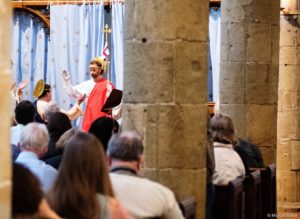Peregrini (meaning ‘Pilgrims’) is a play about Christ at Emmaus, which was written by a Durham monk in about 1150.
Find out more
Discover the history behind the writing of Peregrini and find out how we reconstructed its lost music
Luke and Cleophas, two pilgrims returning from Jerusalem, are mournfully discussing the recent execution of Jesus, who they had hoped would be the Messiah; they have heard a rumour that he has risen from the dead, but they don’t believe it (although Luke wants to). A stranger meets them on the road, asks why they are so sorrowful and explains to them the Old Testament prophecies of the birth, death and resurrection of the Saviour. Reaching Emmaus, they compel him to stay and share a meal with them; as he invokes a blessing on their food, Luke suddenly recognises him as Jesus – but he has vanished. At once they set off to return to Jerusalem. Meanwhile, Jesus’s disciples are discussing whether or not to believe Mary Magdalen’s claim to have met the risen Jesus. Suddenly, Peter bursts in with the news that he has just seen Jesus, closely followed by Cleophas and Luke, who bear a similar message. Andrew and James are rejoicing over the rise of a new ‘sun’ (Jesus) when the sceptical Thomas appears. He refuses to believe in the resurrection unless he can place his fingers in Jesus’s wounded hands and side. He persists in his scepticism despite anything the disciples can say until Jesus appears and invites him to touch his wounds; Thomas acknowledges the risen Jesus, and the play ends with a triumphal hymn about the resurrection.
The play was sung in Latin. Because it is preserved in a collection of Lawrence’s poetry rather than a liturgical manuscript, its original music does not survive, but was reconstructed from music in manuscripts which were in Durham in his time and which he must have known.








